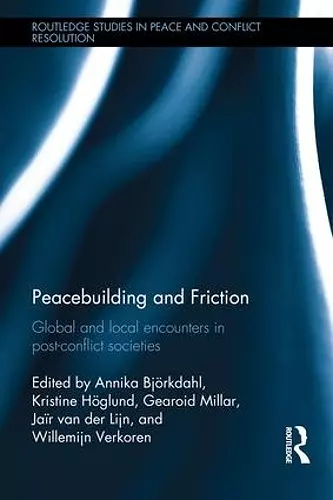Peacebuilding and Friction
Global and Local Encounters in Post Conflict-Societies
Willemijn Verkoren editor Annika Björkdahl editor Kristine Höglund editor Gearoid Millar editor Jair van der Lijn editor
Format:Hardback
Publisher:Taylor & Francis Ltd
Published:1st Mar '16
Currently unavailable, and unfortunately no date known when it will be back
This hardback is available in another edition too:
- Paperback£45.99(9781138308954)

This book aims to understand the processes and outcomes that arise from frictional encounters in peacebuilding, when global and local forces meet.
Building a sustainable peace after violent conflict is a process that entails competing ideas, political contestation and transformation of power relations. This volume develops the concept of ‘friction’ to better analyse the interplay between global ideas, actors, and practices, and their local counterparts. The chapters examine efforts undertaken to promote sustainable peace in a variety of locations, such as Cambodia, Sri Lanka, Afghanistan, and Sierra Leone. These case analyses provide a nuanced understanding not simply of local processes, or of the hybrid or mixed agencies, ideas, and processes that are generated, but of the complex interactions that unfold between all of these elements in the context of peacebuilding intervention. The analyses demonstrate how the ambivalent relationship between global and local actors leads to unintended and sometimes counterproductive results of peacebuilding interventions. The approach of this book, with its focus on friction as a conceptual tool, advances the peacebuilding research agenda and adds to two ongoing debates in the peacebuilding field; the debate on hybridity, and the debate on local agency and local ownership. In analysing frictional encounters this volume prepares the ground for a better understanding of the mixed impact peace initiatives have on post-conflict societies.
This book will be of much interest to students of peacebuilding, conflict resolution, security studies, and international relations in general.
‘This important volume adds a new dimension to the study of peacebuilding, in the light of recent work on power-relations, hybridity, and the local turn. The notion of 'friction' allows for a more detailed and sensitive understanding of their complex interplay, drawing in new disciplinary matters, foregrounding the overwhelming significance of the subjects of peace and their daily ethico-political struggle, and throwing new light on current policy practices. This volume will stimulate new thinking about peace in the contemporary era.’ -- Oliver Richmond, University of Manchester, UK
‘For some time, debates on international efforts to build peace have been stuck in an intellectual quagmire around "hybrid" political orders. This volume is the first to break out of this now stale debate to offer new conceptual and evidence-oriented analysis of peacebuilding with a fresh conceptual approach of "friction". In studies of key cases such as Afghanistan, Cambodia and Timor-Leste, combined with insightful thematic analysis of transitional justice and civil society, the contributors to this excellent volume provide a significant new contribution to the peacebuilding field.’ -- Timothy Sisk, University of Denver, USA
‘This interesting and very useful book combines theoretical and empirical analyses of post-conflict peacebuilding to advance our understanding of local ownership and hybridity. It accounts for the complexity of global and local efforts with a nuanced and fresh lens. A must read!’ -- Thania Paffenholz, Graduate Institute of International and Development Studies, Geneva, Switzerland
ISBN: 9781138937512
Dimensions: unknown
Weight: 476g
222 pages